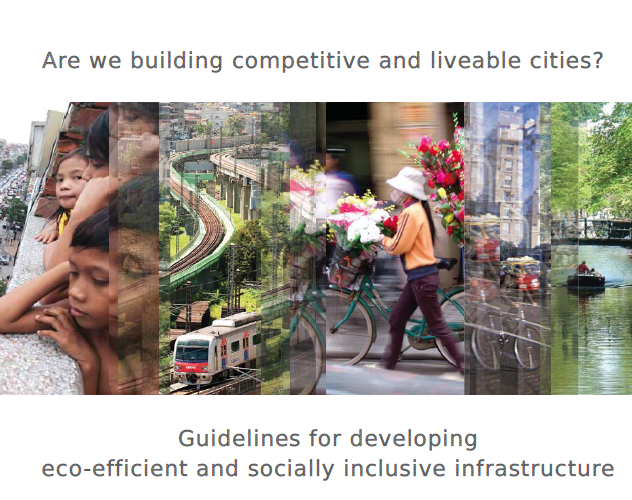The "Guidelines for developing eco-efficient and socially inclusive infrastructure" are based on the recognized need for an urgent shift in the way urban infrastructure is planned, designed and managed in order to respond to the challenges posed by rapid urbanization, globalization and climate change.
 October 2011: The UN Economic and Social Commission for Asia and the Pacific (ESCAP), the UN Economic Commission for Latin America and the Caribbean (ECLAC), and the UN Human Settlements Programme (UN-HABITAT), in partnership with the Urban Design Lab of the Earth Institute, Columbia University, have jointly released the “Guidelines for developing eco-efficient and socially inclusive infrastructure,” which provide practical tools for city planners and decision makers to reform urban planning and infrastructure design according to the principles of eco-efficiency and social inclusiveness.
October 2011: The UN Economic and Social Commission for Asia and the Pacific (ESCAP), the UN Economic Commission for Latin America and the Caribbean (ECLAC), and the UN Human Settlements Programme (UN-HABITAT), in partnership with the Urban Design Lab of the Earth Institute, Columbia University, have jointly released the “Guidelines for developing eco-efficient and socially inclusive infrastructure,” which provide practical tools for city planners and decision makers to reform urban planning and infrastructure design according to the principles of eco-efficiency and social inclusiveness.
The guidelines build on knowledge accrued and lessons learned though case studies and pilot projects conducted in cities across Asia and Latin America. It is based on the recognized need for an urgent shift in the way urban infrastructure is planned, designed and managed in order to respond to the challenges posed by rapid urbanization, globalization and climate change.
The guidelines contain sections on: the importance of building urban infrastructure in an eco-efficient and inclusive way; what strategies planners can use to facilitate eco-efficient and inclusive outcomes; how they should be integrated in a strategic planning cycle; and who is making the change based on best practices examples from Singapore, Republic of Korea, Sri Lanka, Colombia, Philippines, Japan, Tajikistan and Chile. [Publication: Are we Building Competitive and Liveable Cities? Guidelines for Developing Eco-efficient and Socially Inclusive Infrastructure]